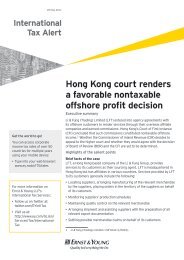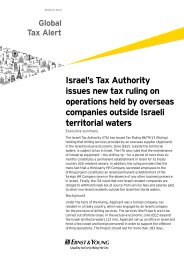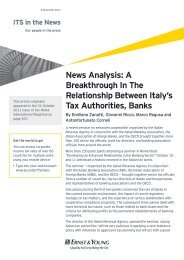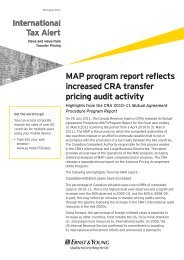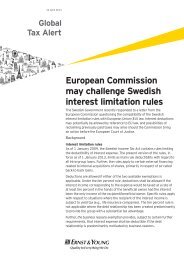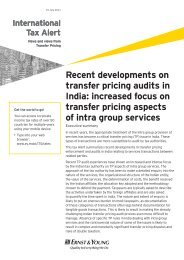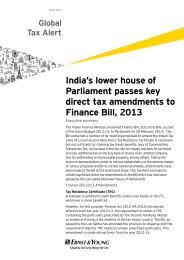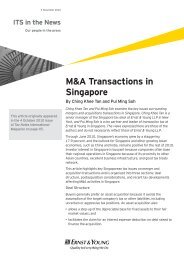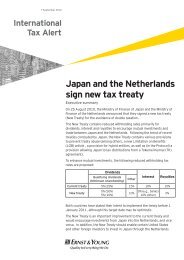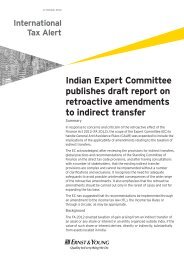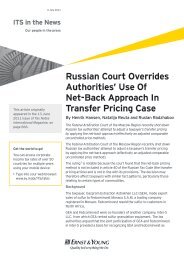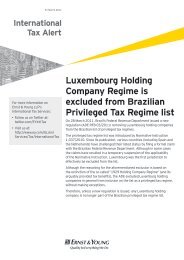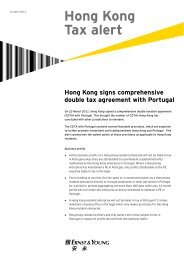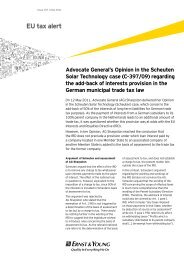Download - Ernst & Young T Magazine
Download - Ernst & Young T Magazine
Download - Ernst & Young T Magazine
You also want an ePaper? Increase the reach of your titles
YUMPU automatically turns print PDFs into web optimized ePapers that Google loves.
Feature Tax as a factor of executive mobility<br />
Upward and<br />
outwardly mobile<br />
Global business leaders need to be mobile, but this brings real costs,<br />
not least in terms of potentially higher personal taxes. Employers also need<br />
to manage their risks from increased mobility.<br />
33%<br />
Percentage of companies<br />
that have at least one<br />
percent of their workforce<br />
on an assignment<br />
away from home.<br />
• By Nigel Gibson<br />
Summary<br />
A growing number<br />
of business executives<br />
are spending much<br />
of their time in jobs<br />
away from home, as<br />
business becomes more<br />
globalized. Employers<br />
need to address the tax<br />
and financial challenges<br />
this presents.<br />
Despite worries about the strength of<br />
the world economy the number of<br />
employees working in a foreign country<br />
on a long-term contract has also remained<br />
buoyant. Indeed, it has hardly been affected by<br />
the dark days of 2008. What does this mean?<br />
First, it suggests that companies realize the<br />
benefits of deploying people with<br />
the skills and experience required<br />
in promising, new markets.<br />
Second, it means that firms are<br />
more efficiently managing a<br />
number of considerations best<br />
coordinated centrally - from<br />
unequal rates of tax to domestic<br />
pensions and complicated<br />
systems of social security – which<br />
can deter executives from<br />
accepting an assignment, long or<br />
short, in another country.<br />
Michael Dickmann, Professor<br />
of International Human Resource<br />
Management at the UK’s Cranfield University, and<br />
the author of Global Careers, a new book on the<br />
subject, explains that global careers are<br />
becoming increasingly important. “This is<br />
because we all know that the world is becoming a<br />
smaller place in one sense. We all see the rising<br />
multinationals from developing countries. We<br />
know that they operate much more globally, but<br />
even small organizations nowadays have global<br />
issues to master.”<br />
Assignment challenges<br />
Having worked with many well-known<br />
multinationals, Dickmann and his co-author,<br />
Yehuda Baruch, are under no illusions about the<br />
need for change. Although more companies now<br />
Credit: Uwe Noelke<br />
employ more people on assignments in more<br />
places around the world, there are no easy<br />
solutions to the problems it creates. “What it<br />
means for organizations is that they have to<br />
start thinking about different patterns of<br />
international work and to understand their<br />
individuals better, as well as the tensions in the<br />
whole process,” says Dickmann.<br />
Chief among which obstacles is tax. Moving<br />
from a country with a high rate to one where<br />
they pay little or no tax may seem straightforward<br />
to an employee. But expecting executives to<br />
move between destinations with markedly<br />
different rates of tax, not to mention social<br />
security and other changes, can lead to strife,<br />
disillusion and, sometimes, even defections.<br />
To overcome these problems, some 85% of<br />
multinational companies adopt what is known as<br />
tax equalization. This aims to create a level base,<br />
so that all mobile executives feel part of the same<br />
team. Chris Debner, Senior Manager for Human<br />
Capital at <strong>Ernst</strong> & <strong>Young</strong> in Zurich, explains: “If<br />
you go abroad with a company, the amount of tax<br />
you pay is equalized in such a way that you do<br />
not lose out. There is often something called a<br />
net promise which means that, as an employee,<br />
you do not suffer from a higher rate of tax and<br />
neither benefit from a lower one. Especially in<br />
financial services the amount of tax that needs to<br />
be paid is a factor in how mobile some executives<br />
are prepared to be.”<br />
Taxing alternatives<br />
There are two other main ways to manage an<br />
employee’s liability when on a foreign<br />
assignment, which are hardly used anymore. One<br />
is tax protection, under which the employee is<br />
subsidized if they pay more tax than at home, yet<br />
enjoys a windfall if the posting is to a destination<br />
with a lower rate. The second is laissez-faire, in<br />
16 T <strong>Magazine</strong> Issue 07 <strong>Ernst</strong> & <strong>Young</strong>



